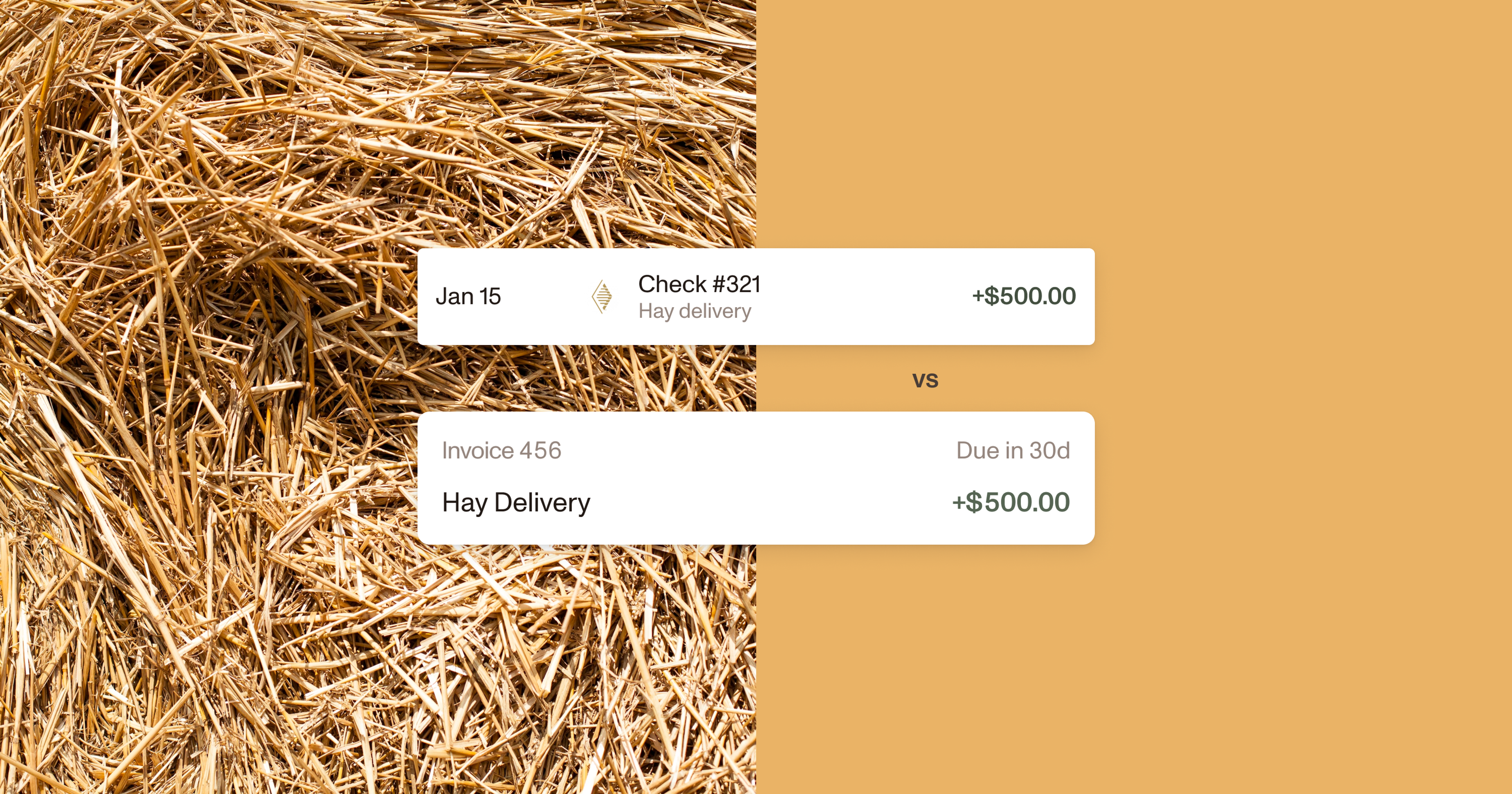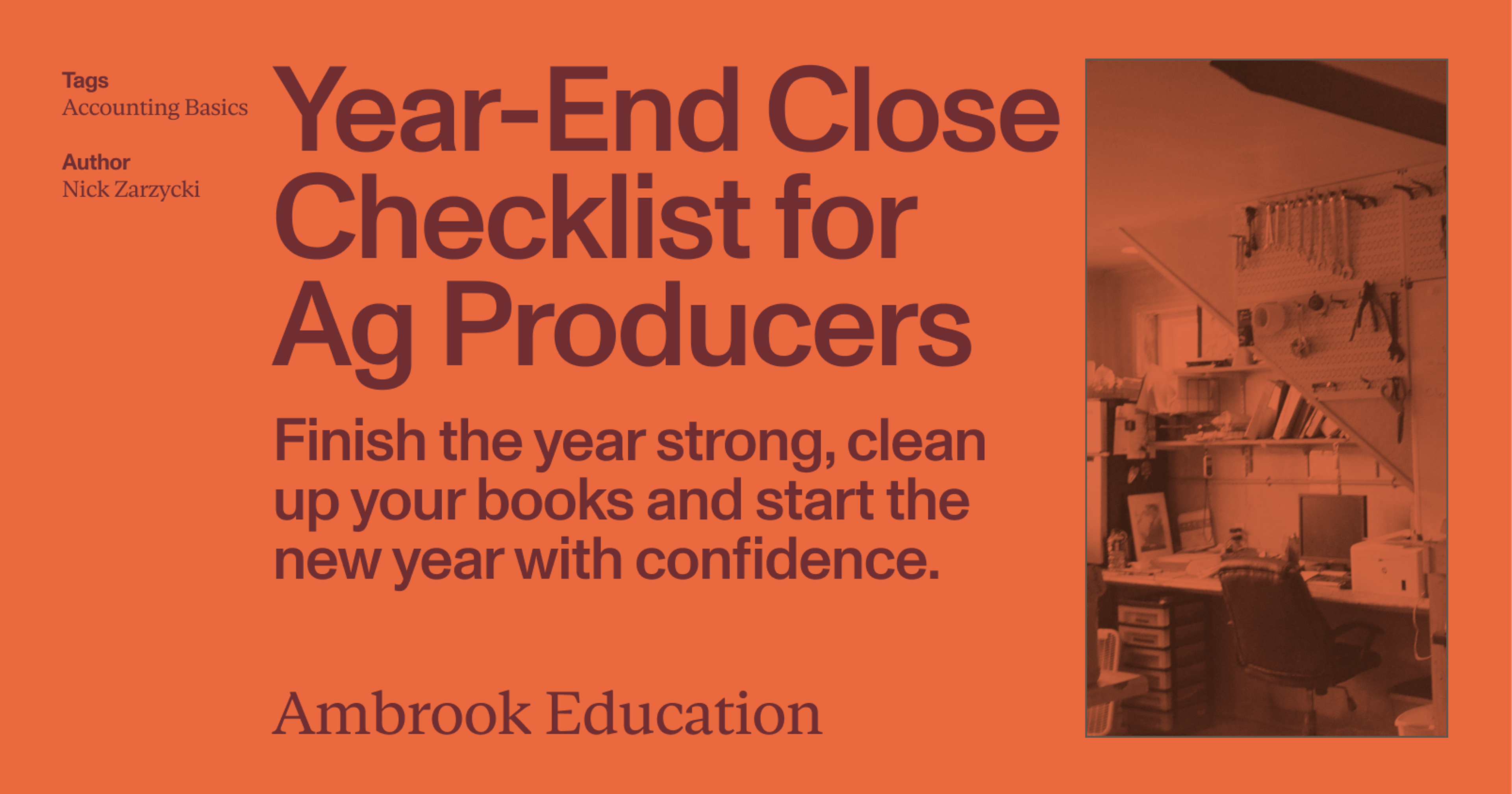Learn which accounting method will work best for your business
Accounting for your business is an all-important process that helps you maintain cash flow, measure success, and comply with tax rules. Before you start, you need to decide on the accounting method you’ll use to determine how you prepare your books and the kind of financial information you have available to analyze.
There are generally two commonly used accounting methods: cash and accrual accounting. In this guide, we’ll help you understand these methods (and a few alternatives) so you can make informed decisions that best suit your business.
Cash Basis Accounting
Cash basis accounting is the simplest accounting method and is used by most agricultural businesses. It recognizes revenue and expenses only when cash is received or paid out.
For example, say you pay cash for seed and fertilizer in the Spring of 2024. Later that year, you harvest and sell your crop under a contract. However, you won’t receive payment for the crop until 2025.
Using cash basis accounting, you would recognize the expenses on your operation’s financial statements (and deduct them on your federal income tax return) in 2024. However, you wouldn’t recognize or pay taxes on the income generated by that crop until 2025. That’s the year of constructive receipt, meaning you can access and use the funds.
Pros of Cash Accounting
Simplicity. Easier to implement and understand.
Cash flow management. Provides a clear picture of actual cash flow, which is crucial for managing day-to-day operations.
Tax benefits. Can offer tax advantages by deferring taxable income recognition — you don’t have to pay taxes on income you haven’t yet received.
Cons of Cash Accounting
Doesn’t show the whole picture. Your operation’s financial statements don’t show accounts payable or accounts receivable, so you don’t have an accurate picture of your long-term finances.
Not available to every operation. Corporations and partnerships with a corporation as a partner cannot use cash basis accounting if their average annual receipts exceed $27 million.
When to Use Cash Accounting
Cash accounting suits smaller-scale businesses that need straightforward financial tracking and prefer simplicity over comprehensive financial analysis. If you sell on credit, meaning you provide goods without immediate cash receipts and invoice customers later, you’re better off using another accounting method.
Accrual Basis Accounting
Accrual accounting recognizes revenue when earned and expenses when incurred, regardless of when cash changes hands.
Returning to the example above, you paid cash for seed and fertilizer in the Spring of 2024 and harvested and sold that crop under contract in the same year. Although you didn’t receive payment under the agreement until 2025, you still report income from the sale in 2024 under the accrual method.
This method of matching revenues with related expenses is more time-consuming but provides a more accurate financial picture.
Pros of Accrual Accounting
Accuracy. Provides a comprehensive view of your business finances by including all earned revenues and incurred expenses.
Financial planning. Helps in predicting future financial performance due to better matching of income and expenses.
Compliance. Often required for large-scale operations and businesses adhering to Generally Accepted Accounting Principles (GAAP).
Cons of Accrual Accounting
Complexity. You need to follow rules to define when and how to record certain types of income and expenses.
Harder to track cash flow. Your income statement might show substantial revenues from sales. However, if your revenue is tied up in accounts receivable on the balance sheet, you may have problems with cash flow.
When to Use Accrual Accounting
Accrual accounting is beneficial for medium to large-scale operations that want a more accurate picture of their financial position for decision-making or must use it to comply with financial reporting regulations.
It’s more complex than the cash method, but financial tools like Ambrook make accrual accounting easier by organizing your bills, invoices, and payments in one platform.
Some businesses use the accrual method for books but use the cash method for tax purposes. This gives them the best of both worlds: keeping books on an accrual basis provides an accurate view of results of operations, but they don’t have to pay taxes on income they haven’t yet collected.
Other Accounting Methods
In addition to the cash and accrual methods, there are other ways to account for revenue and expenses in your operations.
Hybrid Accounting Method
As the name suggests, the hybrid accounting method combines elements of both the cash and accrual method. It’s helpful if your business has a lot of inventory because you can use the accrual method to account for purchases and sales but use the cash method for reporting expenses.
The hybrid method offers the simplicity of the cash method while still capturing accounts receivable and accounts payable, providing detailed financial information to manage your farming business.
Crop Method
The crop method of accounting is available exclusively to farmers. If you harvest and sell crops in a period different from when you planted them, you can deduct the cost of producing the crop in the same accounting year you realize and recognize its income.
For example, say you operate on a fiscal year running from September 1 through August 31. In April, you plant a corn crop. In mid-September, you harvest and sell the crop. Even though you incurred the cost in the fiscal year before the sale, you would deduct those expenses in the period you harvested and sold the crop.
You must get approval from the Internal Revenue Service (IRS) to use the crop method.
Enterprise Accounting
Once you’ve chosen your accounting method, there are other decisions you need to make to better understand the health of your business, like breaking out revenues and expenses between different product lines.
Many farmers and ranchers produce more than one product. For example, you might grow organic blueberries and then process some of those blueberries into a jam you can sell at the local farmer’s market. These represent two different enterprises, so you want to account for them separately to ensure you know where you are making and spending money.
The process of tracking income and expenses across multiple farm products or profit centers is called enterprise accounting, and it’s compatible with both cash and accrual accounting.
Enterprise accounting provides detailed insights to help you identify the profitability of different segments or products. You might opt to use enterprise accounting if you have a diversified operation that needs detailed insights into the performance of various business segments.
Ambrook supports enterprise accounting with enterprise tags that allow you to associate revenues and expenses with a particular line of business. Using these tags, you can compare costs and profits for different enterprises without getting distracted by overhead costs that apply across all enterprises.
Managerial Accounting
Once you choose between the cash and accrual methods and implement enterprise accounting to track different product lines, managerial accounting can provide more information to support your business decisions.
Managerial accounting involves analyzing costs, budgeting, and evaluating performance to help managers make informed business decisions.
For example, you might evaluate production based on appropriate units (such as breeding livestock inventories, acres, weight, or bushels) and use that evaluation to calculate the break-even price for each production unit.
Selecting the Right Farm Accounting Method
Choosing the right farm accounting method is crucial for your business’s financial health and operational efficiency. Whether you opt for accrual, cash, or a hybrid method to track income and expenses, enterprise accounting and managerial accounting can give you deeper insights into your business and enhance the long-term profitability of your operations.
Whichever method you use to track your income, Ambrook can streamline your bookkeeping, invoicing, and bill payment in an all-in-one platform designed specifically for American industry.
Schedule a demo with our team to see how we can help you make more informed decisions powered by accurate financial management.






